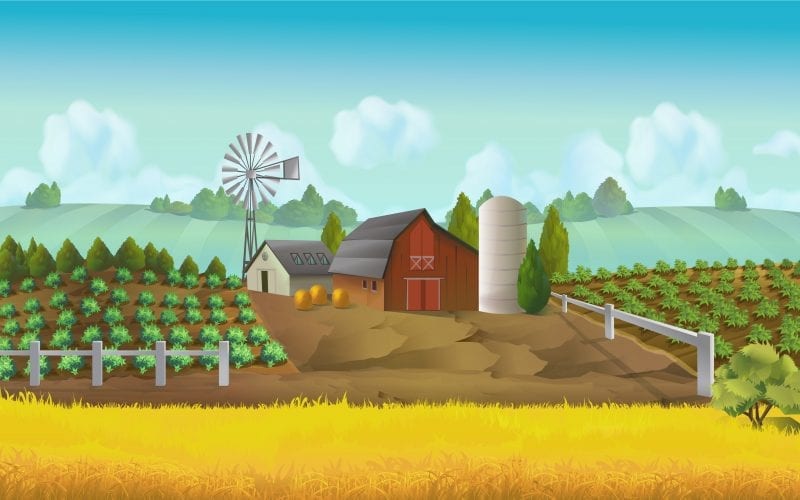With the growing awareness and concern about environmental issues, organic farming has emerged to be one of the most reliable methods that cater to the sustainable development of crops without harming the ecology. There have been various methods and strategies applied through revolutions like the golden revolution, white revolution, black revolution, etc. to increase the quality and quantity of crops and livestock in India. Check this blog for further details about the various advantages and types of organic farming.
This Blog Includes:
What is Organic Farming?
Organic farming is an agricultural method that includes the production of crops and livestock by using natural means instead of spraying pesticides, use of fertilizers, antibiotics, genetic modifications of growth hormones and organisms. Chemical and synthetic use of sprays has caused the environment deterioration at a much larger scale. There are different types of Organic Farming which use biological fertilizers obtained from plants and animal remains. This type of farming also does not use artificial methods of manipulating seasons and follows the natural cycles without affecting the flora and fauna of the place.
The word ‘Organic’ comes from the Greek word ‘”organikos” which literally means ‘pertaining to an organ.’ The meaning of the word has been significantly changed throughout history according to its use. Organic Farming means ‘unadulterated farming’ and was first used by Sir Albert Howard in the 1940s, who was an agricultural researcher in India. He gained inspiration from traditional and sustainable practices used by Indian Farmers as opposed to western practices.
Check Out: Career in Waste Management
Objectives of Organic Farming
Here are the core objectives of organic farming:
- The consistent and sufficient production of healthy and nutritious food.
- To grow crops in a manner that sustains the growth of crops without interfering with their innate behaviours and conditions.
- To minimize pollution, soil erosion, and soil degradation.
- To provide optimal long-term fertilization through natural pesticides for the biological activities of crops.
- To maintain genetic and biological diversity among plants and animals.
- To promote the use of recycling materials and rely on renewable sources in industries.
- To prepare organic products to protect crops from pests and weeds.
Related Read: Environmental Conservation
Types of Organic Farming
There are two major types of organic farming:
Pure Organic Farming
Pure organic farming is devoid of all the synthetic and unnatural chemicals. The fertilizers and pesticides obtained from cow manure, compost, and animal by-products, such as bone meal or blood meal.
Integrated Organic Farming
Integrated organic farming use of nutrients through Integrated pest management. This type includes growing the crop through natural and renewable means.
Must Read: Types of Waste Management
Methods of Organic Farming
The following are a few methods that are used in several types of Organic Farming:
- Crop Rotation: This technique means that the farms are used alternatively for crops, instead of growing the same crop in one field every year. The rotation helps in the addition of several nutrients to the soil and killing the cycle of insects and parasites.
- Mulching: Many Farmers practice mulching by increasing soil health by adding a layer of organic material (straw, compost) over the soil and removal of weeds. This technique helps in the prevention of weeds, captures moisture in the soil which enriches crop production.
- Green Manuring: Farmers practice this technique by growing cover crops by using cereal seeds, oilseeds, etc., and then plowing them back into the soil. This penetrates the hardpans of the soil, brings up nutrients, and increases aeration in the soil.
Recommended Read: How to Become an Environmentalist?
Advantages and Disadvantages
Here are the various advantages and disadvantages while/due to practicing Organic Farming:
Advantages of Organic Farming
- Organic farming does not require high-priced products.
- It is an eco-friendly method of crop cultivation which allows natural and sustainable growth.
- It is harmless and unadulterated which results in healthy living among humans with food products that are rich in nutrition and antioxidants.
- The demand for organic goods has increased due to traditional production methods which result in higher prices, more trade, and benefits for farmers.
Disadvantages of Organic Farming
- Organic farming requires more laborers which often leads to a decrease or limits production.
- Organic farming is still a novel idea for a few farmers and workers because of the lack of awareness of this method.
- Due to less production, the production of goods only from organic farming isn’t enough for the growing population.
- The products get spoiled easily due to the lack of equipment and tools necessary for organic farming.
- The decline of artificial preservatives results in faster expiration of products.
Also Read: BSc Agriculture
It is essential to adopt these practices and promote awareness about organic farming. Having emerged from India, people should actively work towards conserving such traditions and techniques included in organic farming. If you want to build your career in agribusiness or learn more about organic farming career opportunities, our Leverage Edu experts are here to guide you in cherry-picking the right course and university. Sign up for a free session with us today.

 One app for all your study abroad needs
One app for all your study abroad needs






















 45,000+ students realised their study abroad dream with us. Take the first step today.
45,000+ students realised their study abroad dream with us. Take the first step today.

